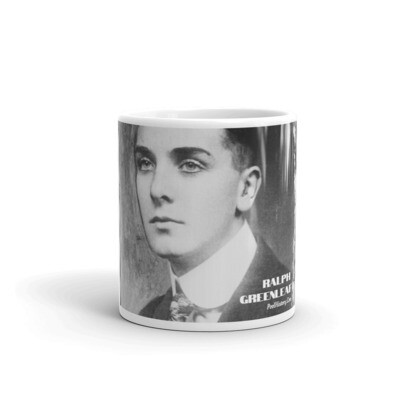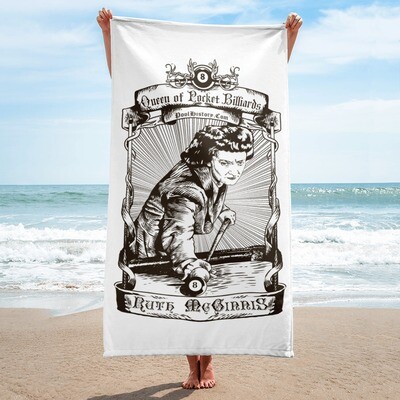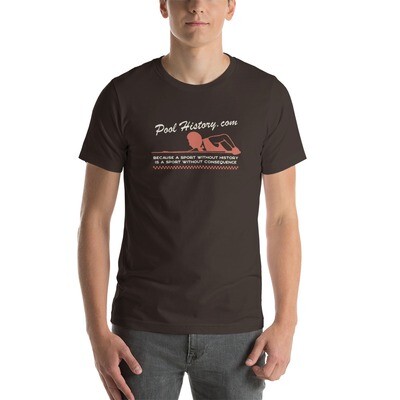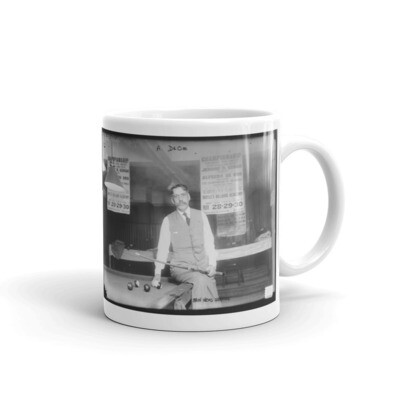“It’s like a nightmare, isn’t it?” The story of Keith McReady in The Color of Money
By now everybody knows that legendary pool hustler Keith McCready was immortalized in Martin Scorsese’s movie The Color of Money, where he played the part of Grady Seasons, who was aptly described as the best money player in the world. And who can forget the unforgettable line uttered by Keith/Grady, “It’s like a nightmare isn’t it?” But what many don’t know was how Keith got that part and the lengths Scorsese went to get him to come to Chicago to play this role.
All this and more is spelled out in my book Pool Wars published in 2009, which many have read, but many more have not. In the book I describe how Scorsese and Tom Cruise first discovered Keith, and what it took to convince Keith that he should make time for a trip to Chicago to meet with them. R.A. Dyer recently asked me for permission to reproduce some of “The Color of Money Beckons” chapter for this website and I was only too happy to say yes. And so just below you have it: my recollections of Keith McReady, Martin Scorsese, Tom Cruise and the making of one of the greatest pool movies ever. You can find my book at your favorite online retailer, or on my website, jayhelfert.com.
— Jay Helfert
Pool Wars: The Color of Money Beckons
Tom was a very bright young man, and asked many questions about why the players did certain things. He wanted to know why they chalked their cue a certain way, why they used powder and a cloth on their cue, and why they broke the balls from different angles. I patiently answered all his questions, while Scorsese wandered around doing his own investigation of the happenings at Q Master. When Martin returned he wanted to know what was going on in the back room, behind the curtains. I told him the big money games were going on back there, and it was not open to the public.
Naturally he wanted to see what was happening behind the curtains. So I talked with Barry and got them into the back room. The only stipulation was they had to stay against the wall and be quiet. The three of us entered the back room together, where there were three or four money games underway. The biggest game pitted Keith McCready against Danny Medina. They were playing a “race to eleven” for $1,500 and Keith was in full gear, laughing and joking with all the onlookers. He was both hysterical and brilliant at the same time, and I could tell Scorsese was enthralled by him.
After the tournament we all went our separate ways, but not before Scorsese asked me how to get in contact with Keith. I explained to him that Keith had no real home, he lived on the road. But he was always in touch with me (usually needing financial assistance), and I could find him if they needed to get in touch with him. I gave Scorsese my home phone number, and sure enough a few weeks later I got a call from his office. It was the casting director, Barbara Del Fina, looking for Keith. They wanted him to come to Chicago to audition for a part in their new movie, The Color Of Money.
I quickly located Keith and told him the good news. He wasn’t that impressed, and told me he didn’t want to fly to Chicago on his dime (his words). I called Del Fina back and explained that Keith wasn’t really that interested in flying to Chicago for an audition. She tried to convince me, telling me what a big deal this was, and how important Scorsese was. All this meant little to Keith. I explained to her that Keith knew nothing about the film making business, and could care less if he was in a movie. If they could take care of all his expenses, he might agree to come. He was currently tied up negotiating pool games and playing the ponies. Those were his priorities.
She relayed this information to Scorsese, and called me back the next day. They would pay Keith’s air fare and put him up in a hotel, if he would come to Chicago for the audition. Keith figured he might find some good action there, so he agreed to go. Before he came, Scorsese wanted him to look at the script, and review the part they wanted him to play. The script was overnighted to me, and Keith came over to my house to read it. The character was named Grady Seasons, and he was supposed to be the best money player in the world. That part Keith liked!
We read the script and there were maybe six lines for Grady Seasons, and Keith didn’t like any of them. He told me, “I would never say anything like that.” So I asked him to tell me what he would say, and together in my den we rewrote the lines for Grady Seasons, and put them in the margin of the script. All this was done with the approval of Scorsese, who after hearing that Keith didn’t like the lines, suggested we rewrite them. And that’s exactly what we did.
Keith Heads to Chicago
A few days later Keith was off to Chicago, ticket in hand. Once he showed up, the other actors trying for the part of Grady Seasons had no chance. He walked into Scorsese’s office and it belonged to him. All the new lines we had written were kept intact, and his part even got expanded. Keith ended up staying several weeks on the set, and was well paid for his work. I met him at the end of the shoot, and accompanied him to the wrap party. I could see Keith was well liked by the crew, and he and Cruise had become fast friends.
The Classic Cup tournament was scheduled to begin outside Chicago a few days later, so the timing couldn’t have been better. Or at least I thought so.
On the first night of the tournament Keith blew most of his paycheck to Efren playing One Pocket, and I was in for a grand myself before I pulled up. I was also staking Danny Medina in this tourney, and he finished third, enough to get me winners for the trip. I’ll tell you about my little road trip with Danny later.

Pool Wars author
Jay Helfert
A few months later they had dual Premieres for The Color Of Money, one in New York and one in Los Angeles. I was hired to provide a few players to entertain the crowd at the ‘after’ party, held at the very ritzy Chasen’s restaurant. Keith, Kim Davenport and Robin Bell came with me to Chasen’s, where they had two tables set up in the lobby. These were the same Murray tables that had been used in the final two scenes of the movie, and they had plaques mounted in the rail attesting to that.
A who’s who of Hollywood walked through that lobby, but very few stopped to play pool with us. Keith ran off to drink and party with his buddies from the filming, leaving the rest of us to stay obediently at our posts, with the pool tables. We shot trick shots and entertained whoever stopped to visit. Only a few of the celebrities wanted to play pool, and I can only remember Lynn Swann hanging out for more than one game.
Of interest to me was the silent auction going on for these two tables. No one was bidding, and I felt they may have value as collector’s items, after the movie came out. I asked if I could bid and was told yes, that all money raised from the auction was going to charity. At the end of the night one table had a high bid of $1,500, and the other table had a single $1,000 bid. I went ahead and bid $1,100 for this table, just to see what would happen. The next day I got a call from someone saying I had won the table. They asked me where I wanted it delivered too. I was renting a house in West Los Angeles, and the only room large enough was the living room. A week later, the soon to be “most famous pool table in the world” was in my living room, plaque and all.
Jay Helfert, author of Pool Wars and More Pool Wars, has been successful as a pool player, road warrior, card player, stake horse, gambler, pool room owner, tournament director, television commentator, and movie consultant. Find out more at JayHelfert.com.
Pool History Merch
Help preserve pool history by purchasing a coffee mug, t-shirt or other merch. That's because we re-invest 100 percent of net sales proceeds to pay guest writers and artists. Have an article to pitch? Go to the Guidelines for Guest Writers tab for more info.
Pool History Merch
Help preserve pool history by purchasing a coffee mug, t-shirt or other merch. That's because we re-invest 100 percent of net sales proceeds to pay guest writers and artists. Have an article to pitch? Go to the Guidelines for Guest Writers tab for more info.













Recent Comments